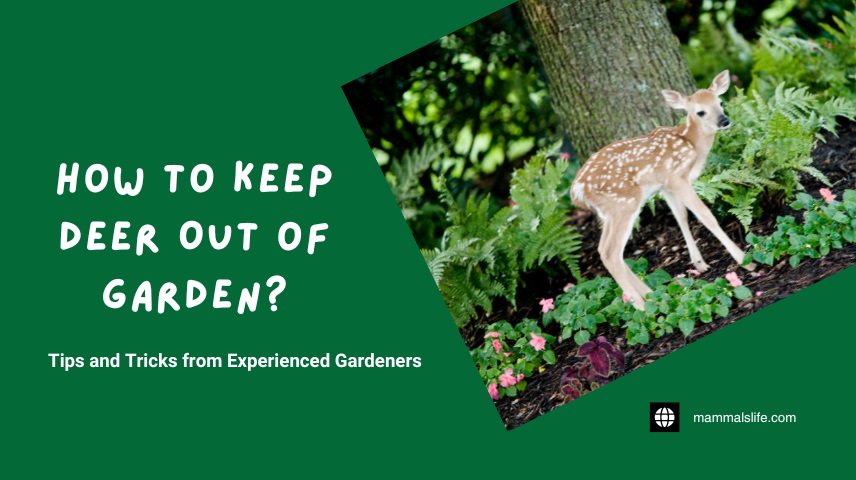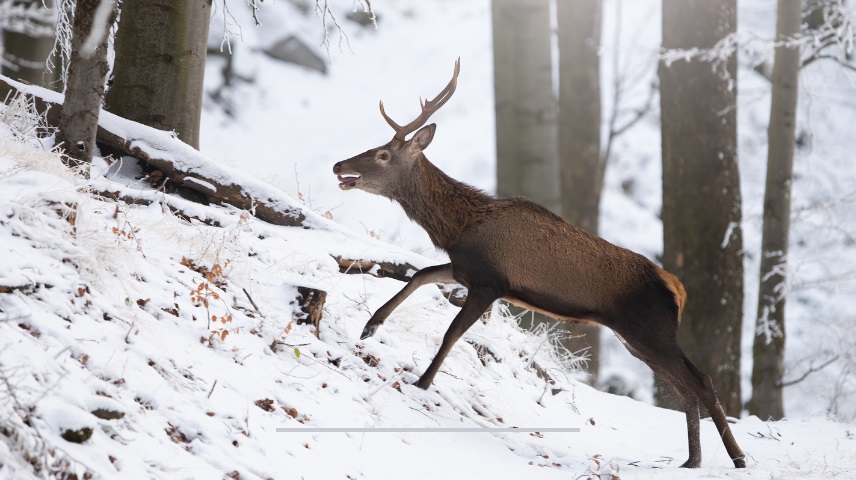Last Updated on February 22, 2025 by Mammals Life
To keep deer out of your garden, use physical barriers like fences and employ deer repellents. Experienced gardeners also recommend planting deer-resistant plants.
Deer can wreak havoc on your garden, consuming plants and causing significant damage. Gardeners often face this challenge, especially in areas with high deer populations. Implementing effective strategies is crucial to protect your hard work. Physical barriers such as tall, sturdy fences are highly effective.
Deer repellents, both commercial and homemade, can deter these animals from entering. Planting deer-resistant varieties also helps keep your garden safe. By combining these methods, you can create a robust defense against deer. Keeping deer out of your garden ensures your plants thrive and your efforts yield rewarding results.
Effective Fencing Solutions
Deer can cause serious damage to your garden. Effective fencing solutions can help protect your plants. Experienced gardeners share their best tips and tricks here.
Choosing The Right Fence
Choosing the right fence is vital. Deer are excellent jumpers. Your fence must be at least 8 feet tall.
Different types of fences include:
- Wooden fences
- Wire mesh fences
- Electric fences
- Plastic deer netting
Wooden fences provide a solid barrier. They also add a rustic look to your garden. Wire mesh fences are durable and cost-effective. Electric fences give a small shock to deter deer. Plastic deer netting is lightweight and easy to install.
Installing Electric Fences
Electric fences can be very effective. They deliver a small, harmless shock to deer.
To install an electric fence:
- Choose the right location.
- Install fence posts around the garden.
- Attach insulators to the posts.
- Run electric wire through the insulators.
- Connect the wire to a power source.
Ensure the electric fence is always on. Regularly check for any damage to the fence.
Using a combination of these fencing solutions can keep deer out of your garden. Protect your plants and enjoy a thriving garden.
Read More – Can You Use a Drone to Recover Deer? Pros And Cons of Drone-Assisted Deer Recovery
Natural Deer Repellents
Deer can wreak havoc on your garden. To protect your plants, natural deer repellents can be effective. These solutions are safe for both the environment and your garden. Below, experienced gardeners share their best tips for keeping deer away naturally.
Homemade Repellent Recipes
Homemade repellents are easy to make. They use common household items. Here are some simple recipes:
- Egg Spray: Mix 1 egg, 1 cup of water, and 1 tablespoon of dish soap. Spray this on plants. The smell keeps deer away.
- Garlic and Pepper Spray: Blend 10 cloves of garlic, 1 hot pepper, and 1 quart of water. Let it sit overnight. Strain and spray on your garden.
- Soap Bars: Hang bars of strong-smelling soap around your garden. Deer dislike the scent.
Commercial Repellent Options
Commercial repellents are convenient and effective. They come in various forms. Here are some popular choices:
| Product | Description | Application |
|---|---|---|
| Deer Off | Uses a blend of garlic and eggs. Lasts up to three months. | Spray on plants and around the garden. |
| Liquid Fence | Made from putrescent eggs, garlic, and other natural ingredients. Safe for all plants. | Apply around the garden perimeter. |
| Plantskydd | Organic and effective. Protects plants for up to six months. | Spray on plants and soil. |
Using natural deer repellents helps maintain a healthy garden. Whether you choose homemade recipes or commercial products, these options are effective. Protect your garden from deer with these easy and natural solutions.
Read More – Do Deer Mourn Their Dead? Examining the Evidence of Mourning in Wildlife
Planting Deer-resistant Plants
Deer can wreak havoc on your garden, leaving you frustrated. One effective way to deter them is by planting deer-resistant plants. These plants can help safeguard your garden. Read on to discover the best plant choices and companion planting strategies.
Best Plant Choices
Certain plants are less appealing to deer. Consider these options for your garden:
- Lavender: Its strong scent deters deer.
- Marigolds: These flowers have an odor deer dislike.
- Foxglove: Its toxicity keeps deer away.
- Russian Sage: Deer avoids its fragrant foliage.
- Yarrow: Deer finds its taste unpleasant.
These plants not only protect your garden but also add beauty.
Companion Planting Strategies
Companion planting can be a powerful deterrent. By combining plants, you can create a deer-resistant garden.
- Mix Strong-Scented Plants: Planting herbs like rosemary and thyme can mask the scent of more desirable plants.
- Layering Plants: Place deer-resistant plants around more vulnerable ones.
- Height Variation: Use taller deer-resistant plants to shield shorter, more appealing plants.
- Color Variety: Choose plants with different colors to confuse deer.
These strategies can help make your garden less inviting to deer.
Here is a table summarizing the best plant choices and their benefits:
| Plant | Benefit |
|---|---|
| Lavender | Strong scent |
| Marigolds | Unpleasant odor |
| Foxglove | Highly toxic |
| Russian Sage | Fragrant foliage |
| Yarrow | Bad taste |
Use these tips and tricks to keep your garden safe. Happy gardening!
Read More – Are Muntjac Deer Dangerous? What You Need to Know About Their Aggression
Using Motion Deterrents
Deer can wreak havoc on gardens. Experienced gardeners recommend using motion deterrents. These devices startle deer and keep them away. Below, we explore two effective types of motion deterrents: motion-activated sprinklers and sound and light devices.
Motion-activated Sprinklers
Motion-activated sprinklers are a great way to scare deer. These devices detect motion and spray water. The sudden movement and splash frighten the deer away. Here’s a quick overview:
- Easy to Install: Attach to your garden hose.
- Adjustable Settings: Control the range and sensitivity.
- Environmentally Friendly: Uses water, not chemicals.
These sprinklers work well in all weather. They protect your plants day and night.
Sound And Light Devices
Sound and light devices create noise and flashlights. This scares deer and other animals. These devices are highly effective. Here are some key points:
- Motion-Activated: Only activates when deer approach.
- Versatile: Can be used in different areas of the garden.
- Energy Efficient: Often powered by solar energy.
Consider using both types of motion deterrents. This combination provides the best protection for your garden.
Creating Physical Barriers
Creating physical barriers is an effective way to keep deer out of your garden. Experienced gardeners recommend several methods that work well. Below, you will find tips on using mulching, netting, and raised garden beds to protect your garden.
Mulching And Netting
Mulching can help deter deer from entering your garden. Use strong-smelling mulches, like pine needles or cedar chips. These smells can make deer stay away. Place mulch around the plants to form a barrier.
Netting is another great option. It creates a physical barrier that deer cannot pass through. Use strong, high-quality netting material. Cover your plants and secure the netting to the ground. This prevents deer from reaching your plants.
Raised Garden Beds
Raised garden beds can protect your plants from deer. Build the beds at least 2 feet high. This height makes it harder for deer to reach your plants.
Use sturdy materials like wood or bricks for the beds. Ensure the sides are smooth and tall enough to prevent deer from jumping in.
For extra protection, add a mesh cover over the raised beds. Secure the cover tightly to keep deer out.
Raised garden beds also offer other benefits. They improve soil drainage and make gardening easier on your back.
| Method | Material | Effectiveness |
|---|---|---|
| Mulching | Pine needles, cedar chips | High |
| Netting | Strong netting material | Very High |
| Raised Garden Beds | Wood, bricks | High |
Maintaining Garden Hygiene
Keeping your garden clean can help keep deer away. Experienced gardeners know this well. Garden hygiene plays a big role in deer deterrence. Let’s explore some tips and tricks for maintaining garden hygiene.
Removing Attractants
Deer are attracted to certain plants and scents. To keep them away, remove these attractants from your garden.
- Remove fallen fruits and vegetables.
- Keep compost bins covered and clean.
- Plant deer-resistant plants like lavender and marigold.
Clean up any food scraps immediately. This reduces the chances of deer coming into your garden.
Regular Garden Patrols
Regular checks of your garden can help spot early signs of deer visits. This allows you to take action quickly.
- Walk around your garden daily.
- Look for deer tracks and droppings.
- Check fences and barriers for any damage.
If you find deer signs, reinforce barriers or use repellents. Regular patrols can keep your garden safe.
Frequently Asked Questions
What Is The Best Deterrent To Keep Deer Out Of Your Garden?
Install a tall fence around your garden, at least 8 feet high. Use deer repellents like predator urine or strong-smelling plants.
How To Make Your Garden Deer-Proof?
Install deer-resistant plants like lavender and marigolds. Use tall fencing around the garden. Apply deer repellents regularly. Install motion-activated sprinklers. Remove attractants like fallen fruit.
What Smell Do Deer Hate The Most?
Deer hate the smell of human hair, predator urine, and strong spices like garlic and chili powder. These scents deter them effectively.
What Is The Most Effective Homemade Deer Repellent?
The most effective homemade deer repellent is a mixture of eggs, water, and dish soap. Blend one egg, one cup of water, and a few drops of dish soap. Spray this solution on plants. The smell deters deer effectively. Reapply after rain or every two weeks.
How Can I Prevent Deer In My Garden?
Install a high fence, at least 8 feet tall, to deter deer from entering your garden.
Conclusion
Implementing these tips can help keep deer out of your garden effectively. Use fences, repellents, and strategic planting. Consistent efforts will protect your plants. Enjoy a flourishing garden free from deer damage. Happy gardening!











